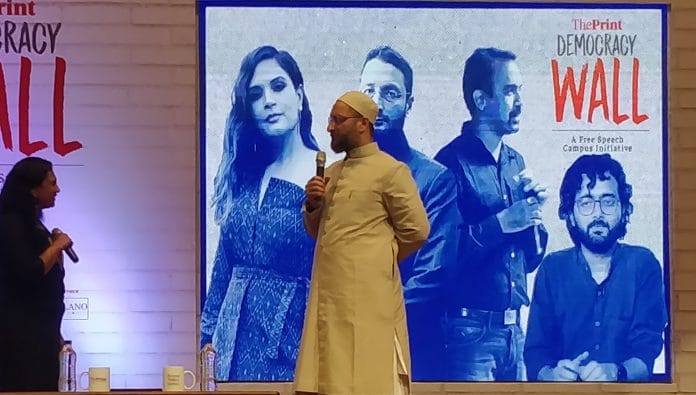Students question the film fraternity’s silence on crucial issues, while Hyderabad MP Asaduddin Owaisi answers tough questions on his contentious statements.
Hyderabad: From the youth’s grievances with the government to the film fraternity’s silence on crucial issues and India’s dream of becoming a global superpower, discussions at the fifth edition of ThePrint’s Democracy Wall dwelt on some of the most pressing issues of the day.
Actor Richa Chadha, Hyderabad MP Asaduddin Owaisi, constitutor Meghnad and comedian Rajasekhar Mamidanna were in attendance as Democracy Wall, a monthly free speech campus initiative, arrived at BITS Pilani, Hyderabad.
One student, from a village in Telangana, expressed anguish at city women drinking and smoking and “having all the vices that men enjoyed”. Several students protested, but the argument showed how women were placed on a pedestal and judged for their choices in many places across India.
In conversation with Chadha, students questioned the film fraternity’s silence on crucial issues, opening up another debate on whether it is right to expect actors to speak up on matters that don’t concern their field.
When someone brought up the Kathua gangrape-murder, Chadha said it was the film fraternity that had spoken up before politicians.
“It was Bollywood actors and actresses who launched a social media campaign against the rape in Kathua, which pressurised the Prime Minister to speak,” she said.
Bollywood celebrities had come under fire in the wake of the Kathua tragedy for alleged indifference, with superstar Amitabh Bachchan seeking to dodge a request for a comment while promoting a film, and other actors only reacting after the incident was reported by the foreign press.
‘A need to change the mindset’
In the larger context of crime against girls and women, Chadha spoke about the need to change the mindset that blamed victims for rape and molestation. “We need to change the way we look at rape, because it’s the rapists that should be excommunicated, and lose their livelihoods,” she said.
Chadha got drawn into a war of words with a student who said he was hurt at her understanding of the lingam as essentially a phallus. He passionately argued that this was a myth, saying the lingam was just a symbol of positive energy. The exchange got heated, but in the end, both Chadha and the student heard each other out.
For us, this was a moment that epitomised how free speech and tolerance in a democracy was all about hearing each other out and agreeing to disagree.
Hyderabad-based comedian Rajasekhar Mamidanna emerged as the perfect break between the intense discussions, providing some much-needed satire and laughs. Mamidanna, a qualified engineer, hit the stage armed with an arsenal of jokes on engineering colleges and courses, and also talked about his parents’ shock when he opted for a career as a stand-up comedian.
Owaisi, a member of the All India Majlis-e-Ittehadul Muslimeen or AIMIM, urged the youth to speak up, play a more active role in politics and voice the concerns they have.
“Don’t wait for the opposition parties to come together, be the masters of your own destiny,” he added, referring to the proposed mahagatbandhan (grand alliance) that seeks to challenge the BJP in 2019.
He said such was India’s electoral process that it made political parties more important, adding that this was the main reason “we don’t see enough young people in politics”.
Unfortunately, only one student showed interest in being a politician when Owaisi asked for a show of hands.
Facing some pointed questions from the students on his contentious statements, the MP said there needed to be a clear definition of hate speech.
“We need to redefine what is hate speech. If a speech invites violence it is a hate speech, but if I make a strong speech against Modi, it cannot be considered hate speech,” Owaisi said.
The leader, seen as a crusader for minority rights, said criticism was the ethos of democracy and suggested he took it in his stride. He, however, hinted that the NDA government didn’t take criticism well. Owaisi said while the Prime Minister claimed to be walking through a “minefield of criticism”, his party members filed defamation cases against media houses.
Constitutor Meghnad did something few teachers can boast of — hold a class and retain everyone’s attention throughout. His tutorial on civics challenged the young minds and provided a much-needed lesson on Indian politics that even politicians should have attended.
Energy ran high among the audience and the speakers, and there was not a dull moment as the City of Pearls hosted Democracy Wall, a platform that transcends the barriers between teenagers and twenty-somethings, and award-winning actors, veteran politicians and thought leaders.






